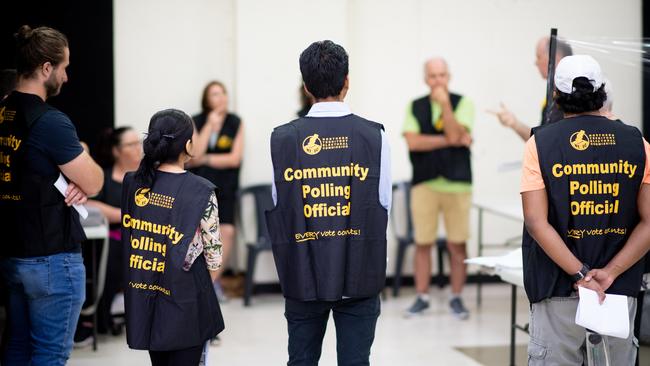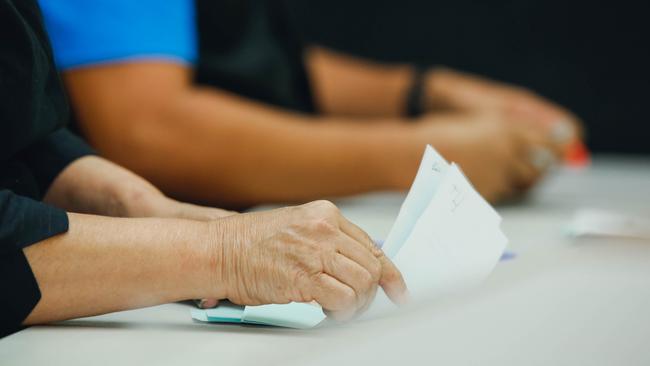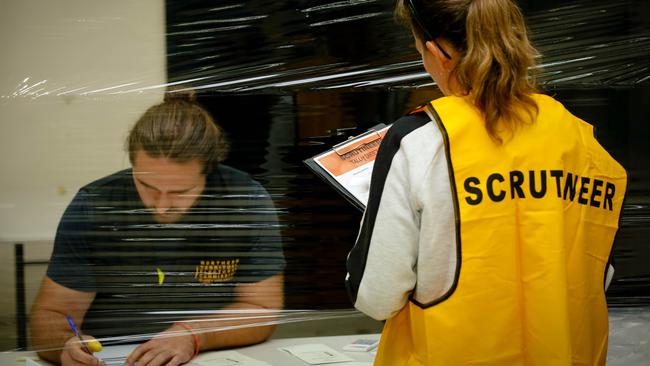NT Electoral Commission launches misinformation register ahead of 2024 election
The register aims to counteract misinformation and disinformation spread about the Territory election. Check if you’ve been caught by one of the common myths.
Politics
Don't miss out on the headlines from Politics. Followed categories will be added to My News.
The Northern Territory Electoral Commission has launched a misinformation and disinformation register in the hopes of counteracting falsehoods ahead of the August general election.
Launched last week, the register provides factual information in response to prominent false statements about electoral processes, along with any actions taken by the commission.
The commission said false information about elections could lead to mistrust in democracy, whether it was misunderstanding or error (misinformation) or deliberate lies (disinformation).
Political advertising and statements made by politicians or parties will not be fact-checked by the NTEC.
Territorians are asked to stop and consider before sharing something they read or see online, including whether it comes from a reliable source.

Six common mistruths have already been included on the NTEC register:
False: Members of parliament are selected, not elected.
Truth: NT voters choose who they want to represent them as Members of Parliament by electing them. The Electoral Commissioner is an independent statutory officer, appointed to run the election in a fair and transparent way.
False: The electoral roll is corrupt and highly corruptible to multiple votes or from voters who don’t exist.
Truth: Enrolment for NT Legislative Assembly and local government elections is managed through a longstanding Commonwealth/State joint roll arrangement with the Australian Electoral Commission (AEC). The AEC receives data from a range government departments/agencies and may include an individual’s surname, given names, date of birth, and address, to keep the roll updated. Information is examined and matched against the electoral roll to identify people who may need an enrolment action to be taken. Voting more than once in elections is against the law. After each election, the NT Electoral Commission undertakes a process to review and identify anyone who has been marked off the electoral roll more than once. It will then make further inquiries and take any further necessary steps, such as making declarations requiring special voting arrangements for some electors.

False: Election officials erase your votes and fill in how they want.
Truth: Pencils are supplied at elections run by the NT Electoral Commission. Electors are also encouraged to bring their own pen if they prefer. During voting, election officials do not have access to completed ballot papers. Ballot papers are stored in boxes that have seals, with seal numbers recorded and these are checked in the presence of scrutineers at the start of counting on election night. The ballot boxes are opened after 6pm, and the ballot papers sorted and counted, under the observation of scrutineers, where present, to verify that the election is carried out in a proper manner.
False: Party scrutineers favour their own party, and no one scrutinises the NT Electoral Commission.
Truth: Scrutineers play an important accountability and transparency role in the election process. They represent candidates or parties, and advise them on the procedures being followed by the NT Electoral Commission, the election manager and election officials. Their role is to satisfy candidates and registered political parties that the election process is carried out fairly, impartially and with integrity. Every candidate is free to appoint a scrutineer to observe counting and voting processes.

False: Election Officials move ballot boxes before election day to hide/destroy them.
Truth: This relocation of boxes is permitted and there are processes in place to ensure there is a robust audit trail of the ballot box movements:
- all ballot boxes are sealed and those seal numbers are recorded by election officials
- when the ballot boxes are collected their security seal is recorded by the early voting centre and the election official doing the collection
- the number is also recorded by Voting Centre Manager on receipt, and the Voting Centre Manager signs for the ballot box
- the Voting Centre Manager then stores the ballot boxes from the early voting centre in a secure zone until they are required for sorting and counting
- the ballot boxes are not moved from the secure area until after voting stops at 6pm on election night.
False: Voting by post is not secret or secure.
Truth: The NT Electoral Commission have procedures in place to check a voter is entitled to vote and to ensure their vote cannot be identified. One important protection is that when an election official is extracting the ballot paper from the postal envelop it is done so the elector details are not visible. Envelopes where the postal vote certificate is not properly signed and witnessed are rejected, not opened and the ballot papers inside are never seen.
Visit ntec.nt.gov.au/about-us/misinformation-register for more information.





